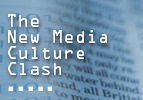



The discourse key
As Deborah Tannen explains as she considers the work of Bobrow and Norman in the field of Artificial Intelligence:
“Any time there is a mismatch between data and process or expectations and occurrences, conscious processes are brought in” (148). This reflects, then, the way in which a person’s perception of the world proceeds automatically so long as expectations are met, while s/he is stopped short, forced to question things, only when they are not (17).
Thus, continued discourse surrounding new media and more opportunities for engaging in new media composition are needed. Ironically,while some students doubt their skill level, others have professional skill sets and previous educational experiences that allow them to compose effective new media compositions. In the absence of a required digital composition, providing an explicit option for new media projects offers less-comfortable instructors with an opportunity to become more familiar with the genre. While some formal programs directly pair faculty with students in the development of digital media to build staff capacity (Metros and Woolsey 2006), this informal option could provide periodic exposure to the possibilities of new media scholarship and serve as an introduction to the genre for instructors.
These findings echo the call from other scholars for greater inclusion of multimodal composition in the college classroom (Cope and Kalantzis 2000; Hayles 2002; and Williams 2001a, 2001b). Further, these increased opportunities must be explicitly stated on course documents and actively discussed in class to ensure the development of clear cultural expectations. We are still in the process of developing our digital rhetoric pedagogy, and, as Mary Hocks explains, “digital rhetoric describes a system of ongoing dialogue and negotiations among writers, audiences, and institutional contexts, but it focuses on the multiple modalities available for making meaning using new communication and information technologies” (2003, 632).
Without this discourse and opportunities to directly engage in multimodal composition, graduate students will remain unable to internalize a structured conceptual framework for authoring new media. Without such a cultural understanding, they will continue to shy away from creating new media scholarship.
Reifying print culture • Moving beyond print • Emerging questions • The discourse key • Works cited • Home